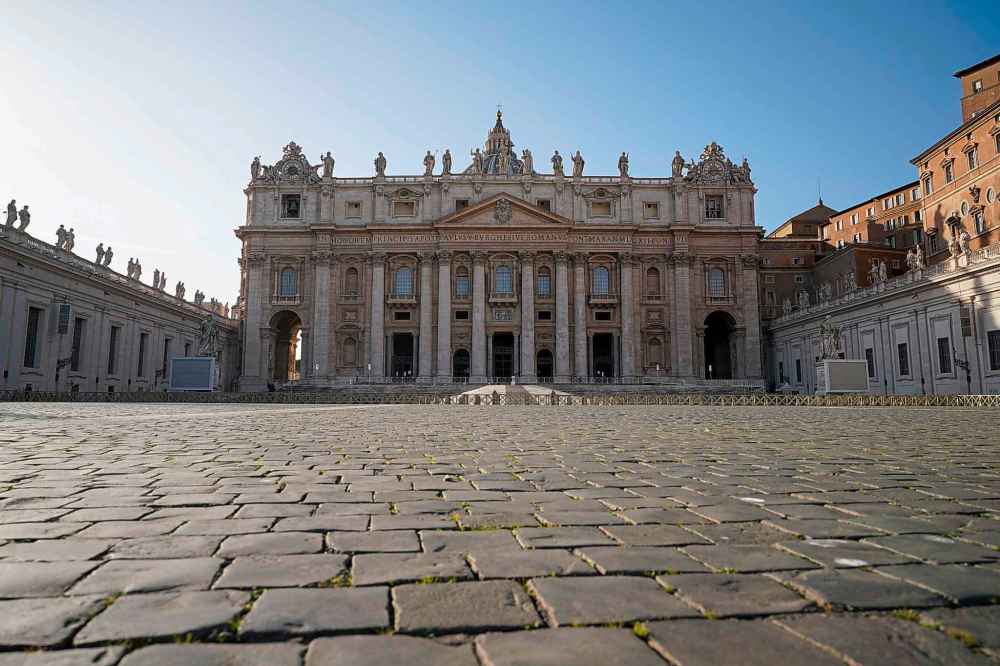Reconciliation needed with Catholic Church
Advertisement
Read this article for free:
or
Already have an account? Log in here »
To continue reading, please subscribe:
Monthly Digital Subscription
$0 for the first 4 weeks*
- Enjoy unlimited reading on winnipegfreepress.com
- Read the E-Edition, our digital replica newspaper
- Access News Break, our award-winning app
- Play interactive puzzles
*No charge for 4 weeks then price increases to the regular rate of $19.00 plus GST every four weeks. Offer available to new and qualified returning subscribers only. Cancel any time.
Monthly Digital Subscription
$4.75/week*
- Enjoy unlimited reading on winnipegfreepress.com
- Read the E-Edition, our digital replica newspaper
- Access News Break, our award-winning app
- Play interactive puzzles
*Billed as $19 plus GST every four weeks. Cancel any time.
To continue reading, please subscribe:
Add Free Press access to your Brandon Sun subscription for only an additional
$1 for the first 4 weeks*
*Your next subscription payment will increase by $1.00 and you will be charged $16.99 plus GST for four weeks. After four weeks, your payment will increase to $23.99 plus GST every four weeks.
Read unlimited articles for free today:
or
Already have an account? Log in here »
Hey there, time traveller!
This article was published 21/03/2022 (1362 days ago), so information in it may no longer be current.
One week from today, on March 28, a 13-person delegation from the Assembly of First Nations will arrive at the Vatican in Rome to meet with the Pope.
The meeting, according to an AFN press release this past week, is “part of broad efforts to seek justice for genocide in Catholic-run residential institutions, including to seek an apology to be delivered in Canada.”
Representing Manitoba will be former AFN National Chief Phil Fontaine, who travelled to the Vatican 13 years ago for the same purpose.

In 2009, then-pope Benedict met in private with then-national chief Fontaine and a small delegation to express his “sorrow” over the “deplorable” treatment Indigenous children suffered in residential schools run by the Roman Catholic church.
Issuing a public statement afterwards, the pope “offered his sympathy and prayerful solidarity” for anyone who suffered and said “acts of abuse cannot be tolerated in society.”
Fontaine, who was abused at a Catholic residential school, called the pope’s statement “significant” and told media: “The fact that the word ‘apology’ was not used does not diminish this moment in any way… This experience gives me great comfort.”
Well, how different 2009 looks now.
Since that day 13 years ago, the number of revelations about the abuse of Indigenous children and their families by Catholic leaders has increased dramatically and continues today.
The most notable discoveries were by the Truth and Reconciliation Commission, which documented thousands of cases of sexual, physical, and mental abuse by Catholic leaders, publishing its final report in December 2015.
This led the TRC commissioners to create a specific call to action (#58) calling on: “the Pope to issue an apology to Survivors, their families, and communities for the Roman Catholic Church’s role in the spiritual, cultural, emotional, physical, and sexual abuse of First Nations, Inuit, and Métis children in Catholic-run Residential Schools” and for it “to occur within one year of the issuing of this Report and to be delivered by the Pope in Canada.”
Called upon for subsequent years by Canadian Catholic priests, Indigenous leaders and even Prime Minister Justin Trudeau, the Pope has continually refused to apologize.
The world of 2009 barely knew of a few hundred unmarked graves at three Catholic residential school sites, with just over six dozen more documented during the TRC.
In May 2021, Tk’emlúps te Secwépemc leaders announced that 251 graves were found at the Kamloops Residential School, which was operated for 77 years by the Oblates of Mary Immaculate.
Ten months later, another 1,500 unmarked graves have been identified at another 11 school sites — with several more searches underway. In Manitoba, researchers are investigating sites in Brandon, The Pas, Dauphin, and Powerview-Pine Falls right now.
But it’s not only past Catholic abuses that have come to light. The Catholic Church still has not paid an estimated $60 million dollars in compensation to residential school survivors.
Instead, the church has fundraised for million-dollar churches, paid millions to lawyers and administrators, or used money earmarked for “reconciliation” to develop and expand evangelical and conversion projects.
Since signing on to the 2006 Residential School Settlement Agreement in 2006, long-promised church fundraising campaigns to compensate survivors have raised under $4 million.
In other words, a papal private statement of “sorrow,” said to a couple Indigenous leaders from your comfortable chair in Rome, now looks like what it actually was: an insult.
It’s expected that during next week’s meeting with the AFN delegation the Pope will announce that he will fulfil call to action #58 and come to Canada to deliver an apology to residential school survivors on behalf of the Catholic Church.
If it happens, this will be an important moment for Indigenous communities and their relationships with the Catholic Church. There are many Indigenous Catholics, like those in my family, who have been wounded by the Pope’s refusal to recognize what the church did.
Any day a TRC call to action is fulfilled it’s a step in the direction of reconciliation, too.
It may, however, be just as important a step – if not more so – for Canadians and Catholics.
How anyone in this country can walk into Sunday mass without seeing the trauma, abuse, and murder in the foundation of Catholicism and one of Canada’s primary churches is a reality that needs to be reconciled.
How do Canadians and Catholics reconcile the fact the Catholic Church in Canada is worth over $4 billion in cash, investments, and property and virtually all of it was built by genocide?
How do we all feel that the Canadian Catholic Church receives more financial donations per year (nearly $900 million) than the Canadian Red Cross, the Canadian Cancer Society and World Vision Canada combined?
This all makes the $60 million owed to survivors look like a few pennies.
Or a visit, in person, with an apology that actually means something.
niigaan.sinclair@freepress.mb.ca

Niigaan Sinclair is Anishinaabe and is a columnist at the Winnipeg Free Press.
Our newsroom depends on a growing audience of readers to power our journalism. If you are not a paid reader, please consider becoming a subscriber.
Our newsroom depends on its audience of readers to power our journalism. Thank you for your support.
History
Updated on Tuesday, March 22, 2022 12:37 PM CDT: Adds tile photo


